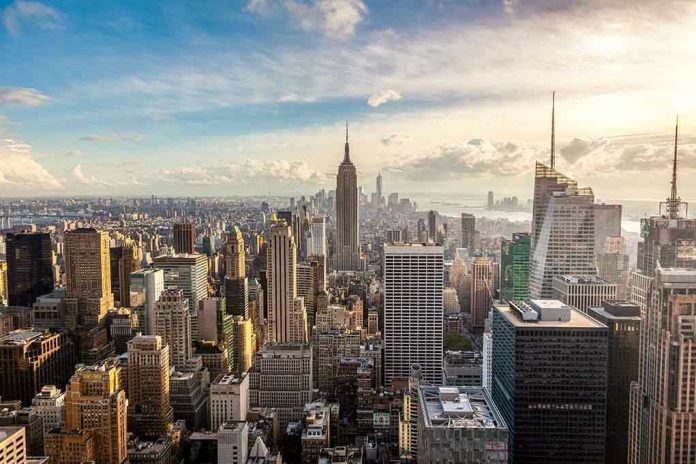
Dave Portnoy’s threat to uproot Barstool Sports from New York City if Zohran Mamdani is elected mayor isn’t just a headline—it’s a warning shot that could signal a seismic shift for NYC’s identity as America’s business capital.
Story Snapshot
- Barstool Sports founder Dave Portnoy vows to move the company out of NYC if Mamdani becomes mayor.
- Portnoy’s opposition centers on Mamdani’s far-left policies and the perceived threat to business interests.
- The controversy highlights growing friction between progressive politics and the business community in New York.
- With the election looming, the city’s future as a business hub hangs in the balance.
Portnoy’s Ultimatum: A Businessman’s Line in the Sand
Dave Portnoy’s message to New York City’s political class is blunt: if Zohran Mamdani, the self-proclaimed Democratic Socialist, seizes the mayor’s office, Barstool Sports will pack its bags and cross the Hudson. Portnoy’s declaration, aired first in a Fox News interview and then hammered home on a widely watched YouTube stream, lays bare his distrust of Mamdani’s platform—policies such as city-run grocery stores and proposals to seize private business assets. Portnoy’s language is raw and unmistakable: “I can’t STAND the thought of Mamdani running f–king New York City. I can’t stand it.” This is no idle threat; Portnoy has directed his finance team to start scouting New Jersey office space, launching a debate that’s reverberated from Wall Street boardrooms to sports radio airwaves.
Portnoy’s stance is more than personal animus; it’s a calculated stand for business autonomy in a city where progressive politics have moved from the margins to the mainstream. The timing couldn’t be more critical. As Mamdani rides the momentum from a dramatic primary upset over Andrew Cuomo, Portnoy’s warning is a rallying cry for CEOs and entrepreneurs who see the city’s economic climate teetering on the edge. The threat to relocate is not new—other executives have rattled sabers over taxes and regulation before—but Portnoy’s polarizing persona ensures his message lands with a thud, not a whisper.
Zohran Mamdani’s Rise and the Business Backlash
Zohran Mamdani’s candidacy has been defined by his embrace of policies that make New York’s business elite bristle: increased public ownership, city-run businesses, and aggressive regulatory reforms. His campaign’s use of the Knicks’ logo in political ads prompted a cease-and-desist from the team, underscoring the institutional pushback Mamdani now faces. Critics, including sports media figures like Stephen A. Smith and Paul Finebaum, have questioned not just his policies but his qualifications—asserting that Mamdani’s platform is “closer to communist than capitalist.” Mamdani, for his part, frames the criticism as the last gasp of a threatened establishment, insisting his reforms are the city’s best hope for social and economic justice.
The tension isn’t just theoretical. Barstool Sports employs hundreds in its NYC office, and the prospect of relocation has sparked anxiety among staffers about job security and disruption. More broadly, business leaders warn that Mamdani’s victory could trigger a domino effect, with other companies following Portnoy’s lead. The stakes are clear: if New York becomes inhospitable to business, its status as a magnet for media, tech, and finance could erode—taking jobs and tax revenue with it.
A Divided City: Politics, Business, and Sports Collide
New York’s mayoral races have always doubled as proxy wars for national debates, but the 2025 contest is especially charged. Mamdani’s ability to topple a political heavyweight like Andrew Cuomo signaled a sea change for the city’s progressive movement. Portnoy’s reaction, amplified by Barstool’s massive audience, has brought the fight out of City Hall and onto the digital stage. Each side claims the mantle of common sense: Mamdani’s camp argues that city-run enterprises are overdue for a population battered by inequality, while Portnoy and his allies warn that strident left-wing policies threaten economic stability and personal freedom.
Legal and cultural skirmishes add fuel to the fire. The Knicks’ legal action against Mamdani’s campaign is almost unprecedented in New York politics, and the social media echo chamber has only intensified the spectacle. The race has become a microcosm of broader trends: progressive insurgency clashing with entrenched business interests, played out under the klieg lights of a city that has always defined itself by its contradictions. With the election just days away, the outcome remains uncertain—but the underlying tension is likely to outlast any single news cycle.
Economic and Political Crossroads: What Comes Next?
Barstool’s possible departure is a canary in the coal mine for New York’s business environment. Short-term consequences are immediate: uncertainty for employees, media scrutiny, and a chilling effect on business sentiment. The long-term implications are more sobering. Should Portnoy follow through, he could set a precedent that encourages other companies to weigh their options outside city limits. Such an exodus could reshape the city’s economic and political landscape, diminishing its reputation as a destination for innovation and ambition.
Yet, the threat of mass relocation has been made before, often with more bark than bite. The business community’s anxiety is real, but the practicalities of moving a major company are daunting. Ultimately, the November election will be a referendum not just on Mamdani, but on the direction New York takes in its perennial tug-of-war between progress and prosperity. One thing is certain: the reverberations of Portnoy’s threat will be felt long after the votes are counted.







